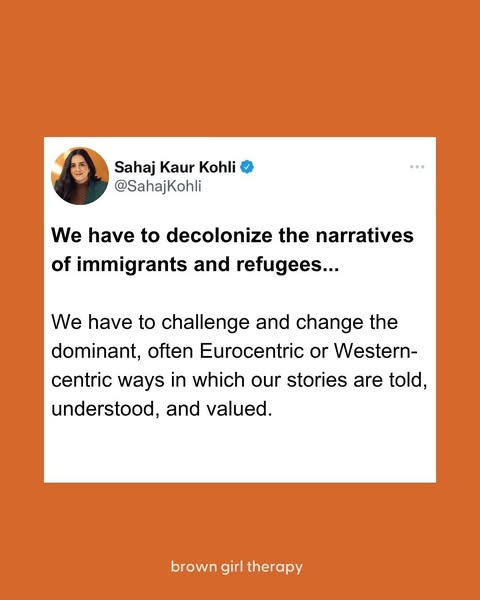"If you're legal, you shouldn't be scared"
And this week's essay on emotional autonomy
‘Legal’ doesn’t mean safe when you’re Brown, Black, or immigrant. Green cards can be revoked. Visas can be denied. Citizenship doesn’t stop ICE from knocking on your door. And profiling doesn’t ask for your papers first. We’ve seen “legal” people deported. We’ve seen families torn apart over paperwork. We’ve seen kids born here live in fear because their parents aren’t safe.
“Why didn’t you just stay in your country or go back home?”
Many immigrants and refugees would have stayed or ““go back”, if colonization hadn’t destabilized entire nations. It stole wealth, languages, cultures, and futures. Borders were drawn by empires. Wars were funded by greed. And now, generations later, we’re told we don’t belong.
“Why do immigrants take our jobs?”
They don’t ‘take’ jobs. They do the jobs this country runs on. Immigrants aren’t stealing. They’re sustaining industries, filling labor shortages, starting businesses that contribute to economic growth, pay taxes, etc.
They’re not a burden. They’re a backbone.
Immigrant lives matter. Refugee lives matter. Asylum seeker lives matter.
What is happening right now is unconscionable. Keep speaking up. Keep protesting. Keep playing your role (educator, protestor, counselor, reporter, etc). Keep safe.
Here are some things I’ve been saying to immigrant and bicultural clients recently:
1. You’re not overreacting. Hypervigilance is a normal response to a system that has made safety and belonging feel conditional.
2. We’re allowed to talk about fear even if nothing ‘happened’ to you yet. Fear lives in the what ifs and the almosts, too, and your nervous system can’t tell the difference. Would it be helpful to talk through and prepare for some of these worries?
3. You can feel grateful for all the privileges and opportunities you’ve had in this country and you can most certainly feel betrayed by it.
4. What’s a saying, mantra, or belief in your mother tongue that can feel grounding right now? I don’t have to understand it.
5. Your worth does not live in paperwork.
6. It's absolutely not your job to educate or explain why you’re scared.
7. What if we didn’t talk about it right now and we just took some time to sit in it and feel it in your body?
8. Safety is a basic need, not a luxury.
What is emotional autonomy?
Emotional autonomy is the ability to understand, own, and act on your feelings, needs, and values — without being controlled by guilt, fear, or obligation to others, especially family. Emotional autonomy means recognizing inherited emotional roles (e.g., the caretaker, the golden child, the peacekeeper) and choosing how much they still serve us. It’s about reclaiming the right to feel, choose, and live authentically, even if it disrupts old patterns.
It doesn’t mean becoming emotionally detached or selfish. It means:
Knowing what you feel
You can identify your emotions without filtering them through someone else’s approval.
You don’t immediately override your feelings to accommodate others.
Expressing what you need
You can communicate your emotional needs clearly and honestly — even when it feels uncomfortable.
You don’t shrink, edit, or translate your truth to make it more palatable.
Making choices that reflect you
Your decisions reflect your own desires, values, and goals — not just your family’s expectations or cultural scripts.
You don’t live in a constant state of negotiation with guilt or fear of disappointing others.
Holding boundaries without collapse
You can say no without spiraling into shame or fear of rejection.
You understand that boundaries can coexist with love — and are often a deeper form of love.
Emotional autonomy is not:
Rejecting your family or culture
Being cold, distant, or emotionally cut off
Doing everything alone or never needing anyone
Disrespecting others to assert yourself
In immigrant families, reclaiming emotional autonomy often means untangling love from obligation, separating your emotional life from your parents’ survival fears, and learning to disappoint others without betraying yourself
Here are 14 signs you lack emotional autonomy:
You feel responsible for your parents’ and others’ emotions
You experience chronic guilt when setting boundaries
You make major life choices to avoid disappointing your family
You silence your needs to keep the peace
You second-guess decisions unless they align with your family’s expectations
You constantly ask: “What will they think?” before making personal choices
You avoid conflict or discomfort at all costs, especially if it risks disapproval
You suppress your emotions to avoid burdening others— especially “negative” ones like anger, sadness, or fear
You fear emotional honesty will lead to rejection or “disrespecting” your elders — or even friends and peers as an adult
You feel drained or resentful after spending time with family, but guilty for feeling that way
You experience extreme anxiety or dread around setting even basic boundaries
You don’t know who you are without your role in the family (e.g., the fixer, the achiever, the protector)
You downplay your joy or success to avoid triggering jealousy, judgment, or guilt trips
You feel emotionally flooded or shut down after interactions
So how can you start to build emotional autonomy? Here are 6 tools:
Keep reading with a 7-day free trial
Subscribe to Culturally Enough. to keep reading this post and get 7 days of free access to the full post archives.




